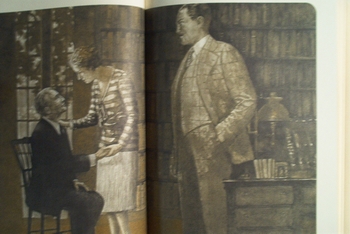Easton Press Eugene O'Neill books
The Iceman Cometh - 1990Franklin Library Eugene O'Neill books
Four Plays - 100 Greatest Books of All Time - 1978Plays by Eugene O'Neill - World's Best Loved Books - 1980
Four Plays - 20th Century's Greatest Books - 1982
Two plays - Pulitzer Prize Classics -1985
Eugene O'Neill biography
Eugene Gladstone O'Neill (1888-1953) was an American dramatist, who was the son of the Irish American actor James O'Neill, and was born in New York City. Eugene O'Neill accompanied his father on theatrical tours during his childhood, attended Princeton University for one year, and worked as a clerk in New York City. From 1909 to 1912 he prospected for gold in Honduras, served as assistant manager of a theatrical troupe organized by his father, went to sea as an ordinary seaman, toured as an actor with his father's troupe, and worked as a newspaper reporter in New London, Connecticut. Having contracted a mild case of tuberculosis, in 1912 he became a patient in a sanatorium; there he wrote his first plays, some of which are included in Thirst and Other One Act Plays (1914). Eugene O'Neill later studied the art of play writing at Harvard University under the American author and educator George Pierce Baker.
Eugene O'Neill lived during most of the next ten years in Provincetown, Massachusetts, and Greenwich Village, New York City, where he was associated both as a dramatist and as a manager with the Provincetown Players. This experimental theatrical group staged a number of his one act plays, beginning with Bound East for Cardiff (1916), and several long plays, including The Hairy Ape (1922), Beyond the Horizon (1920) a domestic tragedy in three acts, was produced successfully on Broadway and won a Pulitzer Prize in 1921, The Emperor Jones (1920), a study of the disintegration of a dictator's mind under the influence of fear. In Strange Interlude (1927) Eugene O'Neill sought to portray the way in which psychological processes impinge upon outward actions, and it won a Pulitzer Prize in 1928. His most ambitious book, the trilogy Mourning Becomes Electra (1931), was an attempt to recreate the power and profundity of the ancient Greek tragedies by setting in 19Th century New England the themes and plot of the Oresteia by the ancient Greek dramatist Aeschylus. Ah, Wilderness (1932), written in a relatively light vein, was also highly successful.
Eugene O'Neill suffered from poor health from 1934 until his death in 1953. During this entire period he worked intermittently on a long series of plays dealing with the history of an American family but completed only A Touch of the Poet, which was published in 1958. After 1939 he wrote three other plays unrelated to the American series, The Iceman Cometh (1946), which portrays a group of characters to live without illusions, and two tragedies dealing with his family, Long Day's Journey Into Night (published 1956), and A Moon for the Misbegotten (published in 1957). In 1936 Eugene O'Neill was awarded the Nobel Prize for literature. Many of Eugene O'Neill's dramas are marked by new theatrical techniques and symbolic devices which express religious and philosophical ideas and give his characters much psychological depth. He employed the sound of tom toms gradually increasing in volume to mark an increase in tension, masks to indicate shadings of personality, lengthy asides in which is characters voice their hidden thoughts, and choruses used like in ancient Greek tragedies to comment on the action of his plays.
Eugene O'Neill is generally considered the most important American dramatist. Throughout his career he attempted to deal with fundamental human problems seriously and with integrity. His best books convey forcibly his vision of modern man, a victim of circumstances who cannot believe in God, destiny, or free will and who therefore blames impersonal causes for his misery and punishes himself for his own sin and guilt. Despite the seriousness and theatrical brilliance of many of Eugene O'Neill's plays, much of his symbolism is obscure, and his innovations in stagecraft often do not achieve the desired effects. In addition, the language of his characters has been criticized for lapses into banality or bathos at many of the most compelling moments in his plays. However, by bringing psychological realism, philosophical depth, and poetic symbolism into the American theater, Eugene O'Neill's plays raised the standards of most later American dramatists and their plays. Eugene O'Neill's other plays include Moon of the Caribees (1918), Anna Christie (1921) which also won a Pulitzer Prize in 1922, All God's Chillun Got Wings (1924), Desire Under the Elms (1924), The Great God Brown (1926), Lazarus Laughed (1926), Marco Millions (1928), Dynamo (1929), and Days Without End (1934).



Comments
Post a Comment
Share your best book review and recommendation